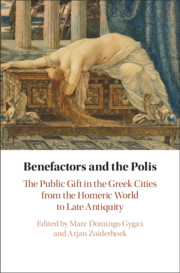 Benefactors and the Polis
Benefactors and the Polis Book contents
- Benefactors and the Polis
- Benefactors and the Polis
- Copyright page
- Contents
- Figures
- Tables
- Contributors
- Acknowledgements
- Abbreviations
- Introduction
- Part I Benefiting the Community in Early Greece
- Part II Classical Benefactors
- Part III Hellenistic Benefactors
- Chapter 5 The Politics of Endowments
- Chapter 6 ‘To be magnanimous and grateful’
- Chapter 7 Socially Embedded Benefaction on Delos
- Part IV Benefactors and the Polis under Rome
- Part V The Decline and Fall of Euergetism?
- Conclusion
- Index
- Index locorum
- References
Chapter 6 - ‘To be magnanimous and grateful’
The Entanglement of Cities and Empires in the Hellenistic Aegean
from Part III - Hellenistic Benefactors
Published online by Cambridge University Press: 21 January 2021
- Benefactors and the Polis
- Benefactors and the Polis
- Copyright page
- Contents
- Figures
- Tables
- Contributors
- Acknowledgements
- Abbreviations
- Introduction
- Part I Benefiting the Community in Early Greece
- Part II Classical Benefactors
- Part III Hellenistic Benefactors
- Chapter 5 The Politics of Endowments
- Chapter 6 ‘To be magnanimous and grateful’
- Chapter 7 Socially Embedded Benefaction on Delos
- Part IV Benefactors and the Polis under Rome
- Part V The Decline and Fall of Euergetism?
- Conclusion
- Index
- Index locorum
- References
Summary
In the Hellenistic period, cities were the cornerstones of imperial rule. Cities were the loci for the acquisition of capital and manpower, and imperial agents (philoi) were recruited for a large part among Greek civic elites. This chapter departs from the dual premise that premodern empires are negotiated enterprises and that they are often networks of interaction rather than territorial states. The relentless competition between three rival superpowers in the Hellenistic Aegean – the Seleukid, Ptolemaic and Antigonid Empires – gave cities a good bargaining position vis-à-vis these empires. The fact that the imperial courts were dominated by philoi from the Aegean poleis moreover meant that these cities held a central and privileged place in Hellenistic imperialism, and benefited greatly from it. Royal benefactions structured imperial-local interactions. They were instrumental in a complex of reciprocal gift-exchange between empires and cities. Empires most of all needed capital, loyalty and military support. As kings were usually short of funds, the gifts by which they hoped to win the support of cities against their rivals often came in the form of immaterial benefactions like the granting of privileges and the protection of civic autonomy.
Keywords
- Type
- Chapter
- Information
- Benefactors and the PolisThe Public Gift in the Greek Cities from the Homeric World to Late Antiquity, pp. 137 - 178Publisher: Cambridge University PressPrint publication year: 2021
References
- 1
- Cited by
